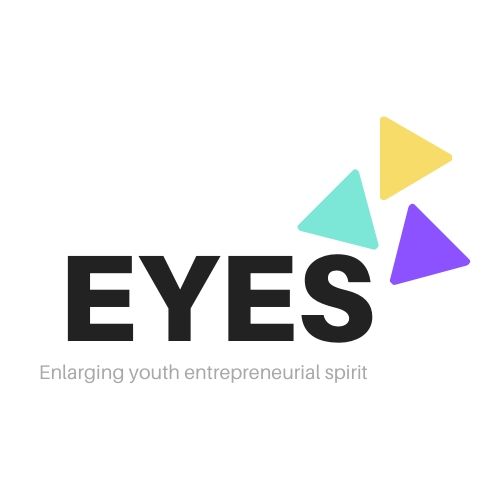EYES (Enlarging Youth Entrepreneurial Spirits) is an international project co-financed by the European Commission under the Erasmus+ Programme; the project is implemented and developed by six organisations from six countries (Belgium, Bulgaria, France,
Germany, Spain & Sweden) sharing the ultimate aim to support professionals in vocational training and integration in changing their teaching practices, to promote the development of a collective entrepreneurial culture and democratic values among young people.
The training framework of the EYES project stems from the EntreComp Framework, the official model promoted by the European Commission as a reference paradigm for teaching, coaching and educating on entrepreneurial competences.
To date, the EntreComp is still the most valuable reference for entrepreneurial education, and it is conceived to be feasible and “exploitable” for all potential targets (Adult Learners as well as High Scholl students). Partners went through the Framework and made use of the 59 learning outcomes that are described on the intermediate / lower level of the model itself – in compliance with Level 3 of the EQF, the most appropriate to address EYES’ target group.
During the last cycle of project implementation, partners gathered together a cohort of 10 young students (i.e., fresh graduates, aspiring your entrepreneurs, etc.) to pilot the EYES training framework: a precious opportunity to test and validate its pedagogical accuracy and educational reliability overall.
The official launch of the piloting sessions has been anticipated by the discussion and sharing among partners of a detailed implementation plan, intended to ease the operationalisation of testing activities at consortium level, while providing for overall
guidance. Thanks to that, partners could rely on a common reference detailing:
– Scale and scope of piloting activates
– General structures of the events
– Key learning outcomes expected from the training session
– Share of roles and responsibilities among partners (i.e., which partner delivers which training module)
– Additional tips for coaching of young aspiring entrepreneurs
– Means for the assessment of learners’ satisfaction and reporting
Upon compliance with few essential common denominators, each partner was free to rely on whatever training format envisioned by their internal coaching and training staff as the most suitable to engage, retain and empower learners.
Each participating organisation piloted their and one of their project colleagues’ module, so as to diversify the content and of the sessions, and make sure that the whole EYES curricula was covered. Depending on the opportunity, partners implemented the piloting
both in online and offline settings following a calendar scheduled together with participants.
The second implementation cycle of the piloting foreseen a series of 1-on-1 coaching sessions with students selected form the general which have demonstrated during the training period a strong, robust and deep predisposition to pursue an entrepreneurial career.
Coaching session have been tailored by the training staff of partners on the specific “business” needs of participants, with narrowed focus on what opportunities, threats, weaknesses and strengths seems stemming from their prototype of entrepreneurial idea:
coaches helped students in preparing a beta-version of business plan, guiding them on how to pitch their idea, identify further ways to improve / enhance their business acumen, management literacy and overall sense of initiative, and all in all, to keep on pursuing
their entrepreneurial interests.
On a topic level, highlights of the coaching sessions were:
- Outline of the business idea, very brief presentation of the needs/opportunities addressed
- The actual presentation of the business offer (service and/or product).
- Communication, Advertising and Marketing (i.e., Marketing Mix)
- Essentials of Project Management
- Estimation of Cost structure and Revenue Streams (i.e., Budgeting)
Reaction among participants were extremely grateful, these events represented for the training staff of partner a vivid opportunity to see and experience in first hand brilliant entrepreneurial minds in-the-making, nurturing in them great expectations for the future…
Takeaways have been collected by trainers for internal reporting and will be compiled in the methodological guide for trainers: a formal deliverable of the project intended to ease and maximise the transferability, portability and scalability of EYES-like initiative
across Europe by any other VET professional interested in capitalising on partners’ experience – what professionals of EU-founded projects recall as “Multiplier Effect”.
To know more about the project and available resources, please visit: www.eyes-project.eu


